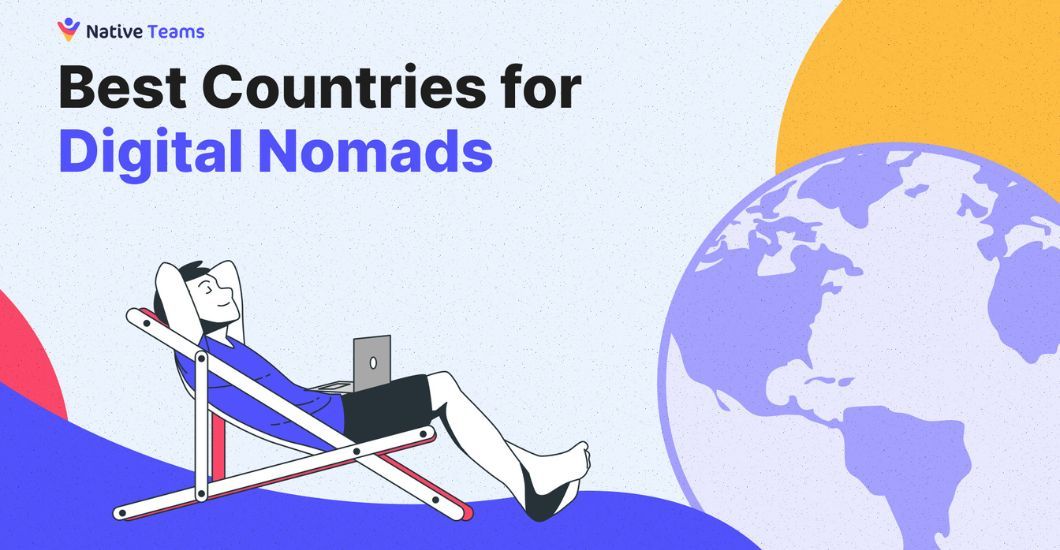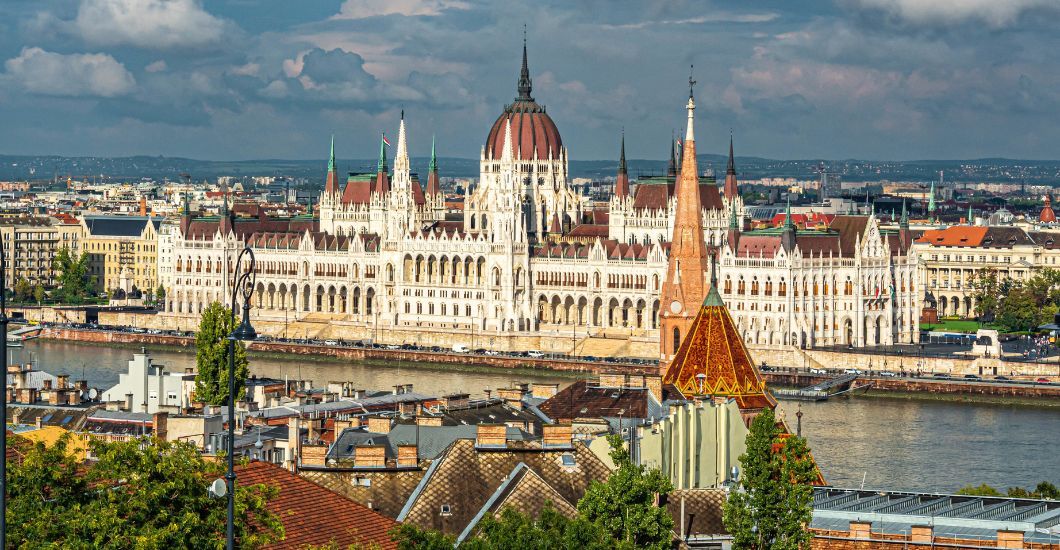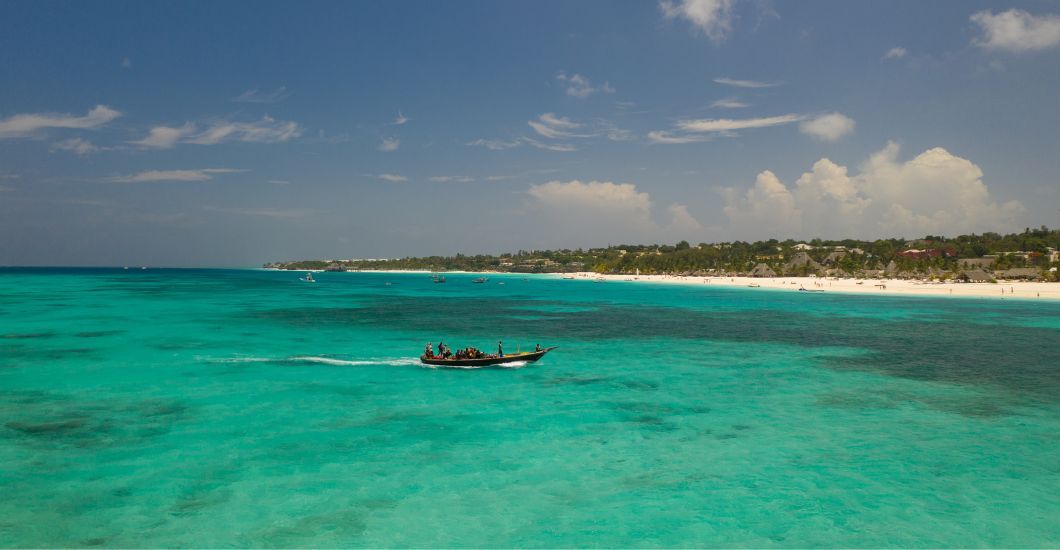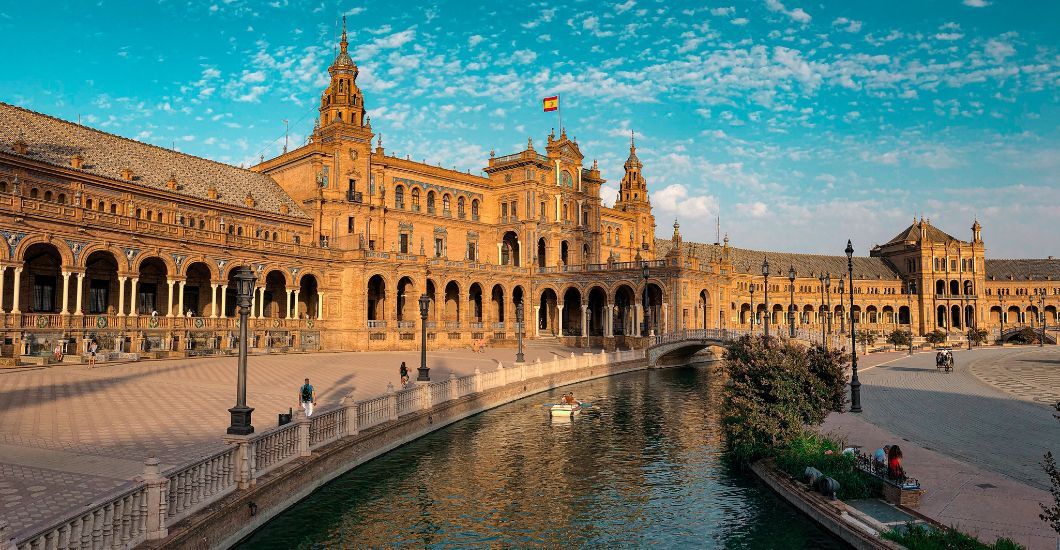Best Countries for Digital Nomads
The opportunities for remote work, especially from all over the world, have never been better. However, becoming a digital nomad is not something that can be done on a whim; it involves visa preparation, saving, and networking with companies that offer remote work.
Numerous people would love to be able to pack their bags and work remotely from any place in the world, but the challenge is in choosing which destination to explore first.
Of course, being a digital nomad isn’t for everyone, but for those who crave independence, travel, and possibility, we’ve developed a list of the most amazing and best countries for digital nomads we know!
Check our article 49 Countries With Digital Nomad Visas and find out which countries provide such visas and how to apply for each!

Top 10 countries for digital nomads
In this section, you will find a list of the best countries for digital nomads and a guide for each country to help and direct you toward the location of your dreams and assist you in deciding which country to visit and work in!
These are our top 10 recommendations:
- Portugal
- Romania
- Mauritius
- Bali
- Hungary
- South Africa
- Germany
- Panama
- Thailand
- Spain
Portugal
Portugal has been one of the most popular locations for digital nomads since it is a safe and expat-friendly country. It provides every amenity a person would need while working remotely abroad. Good internet access, proximity to nature, delicious and interesting food, beautiful weather, vibrant culture, and affordable housing!
The cost of living: Portugal’s affordable cost of living draws digital nomads to it as a location for their remote job. In reality, it boasts Western Europe’s lowest cost of living. A couple can live well in the interior of Portugal or small cities for roughly $1,700 per month, including housing and groceries.
The weather: Portugal experiences a moderate climate affected by the Atlantic Ocean. In the further south, the Algarve region enjoys a dry and sunny microclimate. On the other hand, the cool and rainy climate in the north gradually warms and becomes brighter as one moves south.
Wi-Fi: The fastest internet available in Portugal is 1 Gbit/s; however, your typical provider only offers 350 Mbit/s and fiber optic internet is still being implemented. Portugal has you covered when locating a dependable and quick internet connection.
Community: Portugal is home to some of the world’s best party scenes and countless towns and cities bursting at the seams with historical and natural attractions. Nomadic communities are warm and accepting, and the ultra-high-speed internet in and around the towns makes remote work a breeze.
Taxes: Depending on your salary, you’ll pay different amounts of tax, but nomads will likely pay 20% in addition to social security.
Visas: For non-EU nationals who desire to live in Portugal, such as digital nomads, the D7 Visa, also known as the Digital Nomad Visa, is an excellent alternative. Pensioners with enough passive foreign income to support themselves can consider the D7 Visa as well.

Romania
Romania is the home of legendary castles, pristine forests, and ancient stories. You may visit some of Europe’s most picturesque villages and castles with almost no other tourists in sight. Beautiful cities and affordable monthly rent make Romania a top destination for digital nomads and remote workers.
The cost of living: Romania’s average monthly cost is about €1,100. Everything from housing costs to the cost of running a vehicle is covered, as well as the cost of food and various forms of entertainment. However, your standard of living would drastically improve if you had access to €1,500 monthly.
The weather: Romania’s location on the Balkan Peninsula in southeastern Europe means the country experiences a wide range of seasonal climates. Romania experiences all four seasons with extreme summer heat, mild autumns, frigid winters with snow, and pleasant springs.
Wi-Fi: According to reports, the average download speed across the country is 160 Mb/s on cable and 38 Mb/s on mobile, with ultra-high-speed connections accessible in the country’s largest cities.
Community: Most digital nomads who visit Romania will prefer to stay in Bucharest even if they are just passing through. But there are many great spots in Romania that are great for work, provide lots to see and do, and are comfortable for extended stays.
Taxes: Nomadic workers like digital nomads are not considered tax residents of Romania in contrast to citizens of Romania. Consequently, they won’t have to pay any taxes in Romania.
Visas: As of the 21st of December, 2021, Romania has begun issuing digital nomad visas, which allow holders to stay in the nation for up to a year without applying for a residence permit.

Mauritius
Mauritius is a breathtakingly gorgeous place with deep rainforest, pristine waters, and challenging mountain peaks. The island of Mauritius is home to a fantastically diverse range of cultures, cuisines, and people.
The cost of living: With an average apartment costing between $400 and $800 per month, Port Louis may be the most expensive location in the nation. Outside of the city, though, you can locate more affordable housing.
The weather: The weather in Mauritius is generally mild so that visitors may enjoy their time there at any time of the year. Both summer and winter in Mauritius last roughly the same, from November to April and May to October.
Wi-Fi: Whether looking for a public or secure network, you’ll find a wide selection of Wi-Fi alternatives in Mauritius. They often provide 100 Mbps download speeds and unlimited data usage. Joining a private network is your best bet for a fast and secure Wi-Fi connection throughout your time in Mauritius.
Community: Port Louis’s capital is the most favored location for remote workers. Inexpensive hotels, coworking spaces, cafes, and libraries can be found all across the island, giving you the freedom to pick and choose where you do your job.
Taxes: As a digital nomad, you can rejoice since, at least for the time being, you won’t have to pay taxes in Mauritius. However, if you stay longer than 183 days in a calendar year, you will be considered a tax resident of Mauritius.
Visa: You must meet one of the following criteria in order to apply for the Premium Travel Visa: you are a digital nomad, remote worker, retired person, or self-employed individual who will solely be working remotely for a company outside of Mauritius. Visas for the Republic of Mauritius are issued at no cost.

Bali, Indonesia
For many years, digital nomads have flocked to Bali. It’s no surprise that Indonesia is a digital nomad hub due to its beautiful beaches, colorful culture, and low cost of living. While the country used to be known for its sandy beaches and warm weather, there is much more to it.
The cost of living: Because of Bali’s low cost of living, it’s feasible to get by well on a monthly income of less than $1,000 and, in some cases, as little as $530. Your budget and spending habits determine the monthly food, lodging, and transportation costs.
The weather: Bali lies around 8 degrees south of the equator. As a result, expect a tropical, warm, and humid climate all year, with two distinct seasons: Dry and Rainy seasons.
Wi-Fi: The average Internet speed in Denpasar, Seminyak, and Uluwatu might be as low as 3 Mbps. However, the average Internet speed in Canggu and Ubud is between 12 and 18 Mbps, which is far more usable.
Community: Kuta, Canggu, Seminyak, and Ubud are the primary urbanized regions in Bali’s south, although Ubud and Canggu are without a doubt the most popular among digital nomads, and for a good reason.
Taxes: The new digital nomad visa allows people to stay and work in the country for up to five years without having to pay taxes on their earnings from outside, making it the world’s longest digital nomad visa.
Visa: The visa permits all digital nomads to reside in Bali tax-free for up to five years! The Indonesian government anticipates three million digital nomads. However, the prerequisites and application specifics have yet to be released.

Hungary
Hungary is ideal for digital nomads because of its picturesque surroundings, an abundance of hot springs, and historic buildings with a romantic flair. Hungary has everything you need to prosper, with the amenities and infrastructure of a Western European country and the cost of living of an Eastern European country.
The cost of living: One of the main reasons Hungary is such a popular destination for digital nomads is its low cost of living. Rent, food, and transportation are less expensive than in other European countries. The average cost for digital nomads is around €520.
The weather: The country’s center portion has a humid continental climate, with freezing winters and warm summers.
Wi-Fi: According to the statistics, Hungary has the 16th fastest fixed broadband Internet connection and the 36th fastest mobile Internet connection. In the mobile category, the average global download and upload speeds are 33.71 and 10.89 Mbps, respectively, with a latency of 41 milliseconds.
Community: Hungary has only one large city, where most digital nomads reside. There are several other smaller but nonetheless vibrant spots to set up shop and more rural, humble locations for individuals who desire good internet but a closer connection to nature.
Taxes: When you live in Hungary as a digital nomad for at least 183 days, you have been deemed a tax resident. As a result, after the 183rd day of your stay, you will be obligated to pay taxes. In addition, you will also be obliged to pay social contributions and personal income tax.
Visa: For the Hungary DNV, you must have a monthly income of at least €2,000. Furthermore, you must demonstrate that you have already received this amount 6 months before the entrance.

South Africa
South Africa, located in the southern part of the African continent, is a truly one-of-a-kind destination. South Africa is home to some of the world’s most varied landscapes, an abundance of animals, and world-famous towns; anyone will be blown away by the country’s offerings.
The cost of living: The area in which you choose to live will determine how much rent you spend. A room in a shared apartment or house will cost you between $270 – $530 per month. You should anticipate paying $400 to $1000 monthly if you live alone in a rented flat or house.
The weather: The average yearly temperature of South Africa is 17.5°C, with average monthly temperatures ranging from 22°C December and January to 11°C in June and July.
Wi-Fi: With an average download speed of 19.94 Mbps, it takes 34 minutes and 15 seconds to download a 5 GB video in South Africa.
Community: As a diverse and exciting crossroads of people, cultures, and cuisines, Cape Town is one of the most alluring destinations for digital nomads. The Westlands neighborhood is ideal because it is ultra-contemporary and home to several cool bars, eateries, and coworking spaces. In addition, digital nomads have a wide variety of lodging options.
Taxes: South Africa has a resident-based tax system; tax residents must pay taxes, whilst non-residents, such as digital nomads, must pay taxes on income earned in South Africa.
Visa: US citizens can visit South Africa without a visa if they plan to stay for fewer than 90 days. Furthermore, The Temporary Residence Visa, often known as a Business Visa, is available to digital nomads who intend to stay for more than 90 days.

Germany
Germany is an ideal destination for digital nomads since it is culturally rich, has a fantastic community, and offers exceptional visas for freelancers and digital nomads.
The cost of living: The average monthly cost for a family is €2,704, with an average of €908 going on housing, utilities, and upkeep. Average monthly expenditures for a German family include €356 for food, €351 for transportation, and €284 for entertainment.
The weather: The climate of Germany is generally mild, with pleasant summers and cold winters. The average daily high in January is only 3 degrees Celsius, whereas, in July, it soars to a comfortable 22 degrees Celsius.
Wi-Fi: Germany doubled its average internet speed from roughly 27Mbps in 2015 to over 55Mbps in 2020.
Community: Due to the country’s large popularity among digital nomads, in Germany, you will quickly find a friendly community of like-minded nomads, either on their way to exploring cities or captivated by modern urban attractions, historical sightings, and picturesque old towns.
Taxes: In most circumstances, the value-added tax paid in Germany is 19%; however, it can be as low as 9%. This is determined by the amount of revenue you earn.
Visa: Determining whether a visa or residence permit is required when setting up in Germany is the first step. If you are a citizen of a European Union country and have the required EU passport, there is no requirement to have a visa or residence permit. This is also the case for those from Switzerland and the EEA countries. However, digital nomads coming to Germany must register with the city they find themselves in if they plan to stay for longer than 3 months.

Panama
Located between Colombia and Costa Rica, the small Central American country of Panama is home to the Caribbean and Pacific oceans, as well as several mountains, rivers, waterfalls, museums, shopping centers, and other cultural attractions.
The cost of living: On a monthly budget of $1,995, a couple can enjoy a high standard of living in Panama. If you’re on a tight budget, a monthly budget of $1,000 will get you by in Panama. However, the average cost of living in Panama is between $1,120 and $4,000 per year; therefore, these low prices are only seen in a few of the country’s cities.
The weather: Panama has two main seasons due to the country’s tropical climate: the rainy season, which lasts from May to November, and the dry season which lasts from December to April.
Wi-Fi: Panama is superior to other countries, but it still has problems with its Wi-FI speed. In most cases, access to the internet is not a problem, and every town has at least one internet cafe, many clustered together in high-traffic locations. Invest in a USB modem if you value uninterrupted web access.
Community: Panama City is home to many digital nomads due to its attractiveness as a major city with all the amenities, including skyscrapers and busy sidewalks entirely with businesses. It’s simple to settle in in many towns and start working here, as there are numerous coffee shops and shared office spaces.
Taxes: Because of Panama’s territorial taxation rules, freelancers who do their work from afar don’t have to pay taxes on their earnings as long as those earnings are generated within the country.
Visa: With Panama’s new short-term visa, you can stay in the country for at least 9 months to work remotely. To qualify, you must work remotely for an overseas business.

Thailand
Thailand is a stunning country with a wide variety of natural features, including lush jungles, glistening lakes, white sand beaches, rushing rivers, expansive rice fields, and abundant wildlife. In a matter of minutes, sizzling hot woks turn out mouth-watering dishes all across town, highly delicious and reasonably priced.
The cost of living: Depending on your preferences, the cost of living in Thailand might be relatively low. You should expect to pay about $300 for a shared room in Bangkok, $450 for a private apartment, and $1,000+ for a high-end option in the city.
The weather: Dry and wet tropical climate is the standard description of Thailand’s weather. Thailand experiences three distinct seasons: a hot and humid summer, a wet and chilly monsoon season, and a cold and dry winter.
Wi-Fi: Despite specific gaps, 4G availability is generally satisfactory in Thailand. AIS Mobile, followed by True, is Thailand’s most reliable mobile network in terms of 2G, 3G, and 4G coverage and Wi-Fi speed.
Community: Many locations in Thailand provide pristine beaches, verdant jungles, and warm locals. A good number of cities offer reliable Wi-Fi and a relaxed, easygoing atmosphere, making them ideal for digital nomads.
Taxes: Income made in Thailand is subject to taxation even if you are not a resident of Thailand, defined as spending less than 180 days a year in the country.
Visa: Digital nomad visas, also known as Smart Visas, are a new type of visa in Thailand designed to entice workers with advanced degrees, investors, digital nomads, talented executives, and startup entrepreneurs.

Spain
Spain is well-known worldwide for its excellent cuisine, lively nightlife, exciting festivals, and beautiful blue flag beaches. However, as a digital nomad, one of the best things about being in Spain is having access to the country’s fantastic coastline, which includes the Mediterranean and the Atlantic.
The cost of living: Living expenses in Spain are not low; however, a family of four may expect to spend about €3,093 per month on basic living expenses, while an individual can expect to spend about €1,500 per month.
The weather: Depending on where in Spain you go, the climate might be somewhat different. Typically, the sunniest and driest weather occurs between April and October. However, you can also go between November and March, throughout the winter, if you don’t mind a little rain.
Wi-Fi: Madrid, Seville and Alcobendas are just a few major cities that can access Digi Spain Telecom’s high-speed Internet service. Its top Internet speeds in these cities are between 56 and 367 Mbps. In addition, most Digi Spain Telecom Broadband’s clients get download speeds of between 86 and 361 Mbps.
Community: While the cost of living in major cities like Barcelona and Madrid may be expensive, there are many smaller villages and towns in Spain where you may spend less on necessities.
Taxes: To encourage more people to apply for the Spanish digital nomad visa, the government will reduce the standard rate of 25% to 15% for a maximum stay of four years.
Visa: With the implementation of the proposed legislation for digital nomad visas in January 2023, remote workers can obtain a visa valid for one year of work and residence. Prices will begin at €100 but will range depending on the applicant’s country of origin.

Wrapping things up
As more and more people want to do their jobs away from the traditional office setting, we may anticipate an increase in the number of industries that support remote employees in the near future. Of course, relocating overseas presents its own unique difficulties, but you’ll find personal development, autonomy, and equilibrium in any nation you choose to call it home, so the effort will be well worth it!
Are you not working as a digital nomad yet, but you want to start with your digital nomad career? Check our blog post What Is A Digital Nomad And How Do You Become One?
